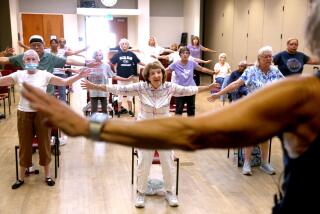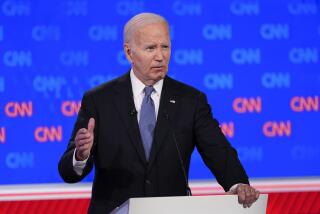At 50, Clinton Has Come of Age in White House
- Share via
WASHINGTON — When Bill Clinton first ran for Congress in 1974, some of his Arkansas aides had a wry nickname for their hyperactive, 28-year-old candidate: They called him “the boy.”
“How’s the boy today?” they’d ask.
When Clinton came to the White House at 46, the second-youngest president ever elected, there was something of the boy still apparent in the man--not only the winning optimism of adolescence but an often-exasperating indiscipline as well. The new president could not stay on schedule. He turned policy meetings into five-hour bull sessions. He seemed incapable of choosing among his own competing priorities. Anecdotes about the boy-president staying up late and gorging on junk food threatened to provide the dominant images of his troubled tenure.
No longer.
Today, Bill Clinton turns 50, an age psychologists sometimes use to mark the onset of “middle adulthood” or “second adulthood,” once known prosaically as “middle age.”
The Democratic National Committee celebrated the occasion Sunday with a glitzy, star-studded gala at New York’s Radio City Music Hall--even though it’s “something I’d just as soon ignore,” Clinton joked last month.
The first baby-boom president is indisputably getting older. Is he getting wiser as well?
At 50, Clinton is visibly gray. He used to jog every day, but now he plays golf more often instead. He’s watching his cholesterol and has sworn off junk food most of the time. He still stays up late at night but not as often--and he takes an afternoon nap now and then. (Not Ronald Reagan-style naps, an aide hastened to add. “We’re not sure how much sleep he really gets in.”)
More important, Clinton has changed his work habits. He sticks closer to his schedule. His meetings still go on too long, aides said, but he drives them toward clearer decisions now. He delegates more detail work to subordinates. He has moderated his pace from the disorganized sprint of his first year in office to a more measured, long-distance run. Once too busy to take days off, he now indulges in weekends and summer vacations that, while far from work-free, include real leisure time.
It sounds presumptuous, so his aides do not like to be quoted on it--but the president has matured.
“He’s acting like a grown-up,” said Princeton University scholar Fred Greenstein, who was critical of Clinton’s early performance. “He’s more comfortable in the White House now. . . . It’s very clear that the gang that couldn’t shoot straight has started working better, and part of that is because Clinton is more disciplined.”
To be sure, he still shows flashes of his younger, more impulsive self. His major speeches remain exhaustive catalogs of competing priorities. Aides worry about keeping his acceptance speech at the Democratic convention next week under the one-hour mark. He can still run late, especially when he is traveling and sees voters’ hands to shake. He can still fall prey to junk food, as he did at a recent ethnic food festival in Chicago. And he occasionally regresses to a distinctly adolescent frame of mind, as when he publicly extolled the charms of a 500-year-old Peruvian mummy on display at the National Geographic Society: “If I were a single man, I might ask that mummy out,” he said. “That’s a good-looking mummy!”
But in larger things, both aides and outsiders said Clinton at 50 is a steadier, more focused, more deliberate man than the 46-year-old from Little Rock, Ark., who arrived in 1993.
“He’s learned how to do the job much better,” said a former aide who left the White House last year. “He’s more disciplined. The whole place is more disciplined.”
Image of Maturity
The proof, aides said, lies in the president’s performance in three areas: In last year’s battle over the federal budget with the Republican leadership of Congress, it was Clinton who held his ground--and House Speaker Newt Gingrich (R-Ga.) who sometimes looked like an adolescent. In foreign policy, after a fumbling start, Clinton discovered the virtues of decisive action in both Haiti and Bosnia-Herzegovina. And this year, in his reelection campaign, the president has stayed doggedly “on message,” repeating his core themes of economic prosperity and concern for the nation’s children and avoiding issues that aren’t part of his strategy.
Clinton acknowledges that he has needed time to overcome his tendency to skip from one idea to another. “It requires enormous discipline not to be distracted and not to be diverted,” he has said.
Several factors have combined to improve Clinton’s performance, aides and associates said.
On one level, he has simply learned through experience how to do his job better. For example, advisor George Stephanopoulos said: “He now knows that he can’t speak offhand in a meeting because people will go out and repeat what he said. . . . He just listens now.”
At the same time, the 1994 Republican takeover of Congress “forced some discipline,” White House Press Secretary Mike McCurry noted. “Facing a Republican Congress, he had to be more focused.”
On another level, Clinton and his staff have worked deliberately to convey a new image of maturity--seeking out events that burnish his image as a leader, highlighting policies that emphasize his concern for children, even changing his suits and ties to convey an older, more middle-aged look. “It works,” Greenstein said. “He looks paternal.”
And on a third, more elusive level, Clinton is simply older now and different from the man who arrived in Washington nearly four years ago. Then he was in a rush to enact an ambitious program as soon as possible. “I’ve learned more humility” since then, he told a television interviewer. “There are a lot of things I don’t know the answers to that I once thought would be easy to find out.”
Sense of Mortality
In his younger years, Clinton sometimes told friends he was haunted by the fact that his father, William Jefferson Blythe, died at 28. “You never really know how much time you have,” he once said.
During the last four years, according to aides, several deaths affected the president deeply and reawakened his sense of mortality. Clinton has buried not only his mother, Virginia Kelley, who died in January 1994, but also his father-in-law, Hugh Rodham; a close White House aide, Vincent Foster, who committed suicide; Commerce Secretary Ronald H. Brown; and a foreign leader he deeply admired, Israeli Prime Minister Yitzhak Rabin.
“Rabin’s death was a real gut check to him,” McCurry said. “He said it reminded him that we don’t know how much time we have on this Earth.”
When he came to the White House in 1993, Clinton tried to run almost everything himself. “Arkansas was a small state, and I could run the place like a country store,” he once recalled. But the White House was different: More people wanted time on the president’s schedule, more issues demanded to be solved, and every chance comment was magnified by the megaphone of the national media--and often, in Clinton’s view, distorted in the process.
In his first year, aides said, Clinton was both a demanding boss, flying into purple rages when his wishes were not carried out, and a lax one. “He was amazingly tolerant of bad performance for a guy who had been elected president of the United States,” a former aide said.
He was also badly overexposed. Aides looked at their records in 1994 and discovered that Clinton made almost 500 public appearances of one kind or another during his first year--with disastrous consequences: His message was muddied, his image one of an out-of-control liberal. “We had to learn that more is not better,” an aide said.
A key change came in the fall of 1994, when Clinton replaced his first chief of staff, childhood friend Thomas “Mack” McLarty, with former California Rep. Leon E. Panetta. Panetta and his aides set about building a new management structure to impose more discipline on their boss. The change, aides said, was dramatic.
No longer were staff meetings called with loose agendas and looser attendance lists. “These days, if you’re not invited, you don’t show up,” one aide said. “In the first year, you could always talk your way into a meeting.”
The process of parceling out the president’s time--the most precious commodity in any White House--came under tighter control. “You can still propose things at the last minute, but you have to jump through more hoops to do it,” the aide said.
The president’s schedulers now leave meetings on political strategy and other favorite Clinton subjects until the end of the day. That way the chief can run late without holding up his other appointments.
And Clinton finally got something he had long asked for: Several hours of free time each afternoon to read, use the telephone and--occasionally--to nap. “He’s religious about protecting that time,” McCurry said.
Schedule Enforcer
Another important move was giving one official authority to enforce the new schedule. That in-house enforcer is Evelyn Lieberman, a wise-cracking, foghorn-voiced former aide to Sen. Joseph R. Biden Jr. (D-Del.). She acts as the president’s gatekeeper, fending off unwanted events and bringing too-long meetings to a close, sometimes by being “deliberately rude,” one aide said. “Evelyn’s scary, which is just what she needs to be,” Stephanopoulos said.
Those changes didn’t come in time to avert the voters’ turn against Clinton in the 1994 congressional elections, but they helped him recover in 1995.
The loss of Congress brought unexpected benefits for Clinton: He not only had to focus more, but also had to act independently more often. In 1995, Clinton infuriated Democratic congressional leaders by breaking with them to call for a balanced federal budget within seven years--but the episode raised his stature in the eyes of voters.
At the same time, Clinton gained self-confidence in foreign policy, where his shaky start in 1993 had made him look unready for the demands of his job. The president bucked conventional wisdom--and opinion polls--when he decided to send American troops to Haiti in 1994 and Bosnia in 1995. But the enduring effect was to bolster his credentials as a mature and tested leader.
And Clinton has worked deliberately to appear more grown-up.
Last year, in a memo to campaign strategists, feminist author Naomi Wolf proposed a new metaphor for the president as he fought Republican budget cuts. “Clinton should be portrayed as ‘the good father,’ ” she wrote, “. . . the comforting authority figure who builds and then defends the family home.”
Aides said Wolf’s idea was not a significant part of their planning, but they also said the idea of emphasizing the president’s qualities as a national leader and, yes, a father figure were “just common sense.”
“That was a side of Bill Clinton that was always there,” Stephanopoulos said.
So Clinton has focused much of his domestic agenda this year around children: more funding for education, a campaign against underage smoking and support for such measures as school uniforms, local curfews and the “V-chip” system to rate television programming.
And he has given more emphasis to the parts of his job that seem to confer maturity and stature: public ceremonies, “bully pulpit” speeches on values and morality, even funerals.
“He’s acting like a father,” Greenstein said. “The turning point was Oklahoma City,” where Clinton led the nation in mourning following the bombing of a federal building in 1995. “That was very paternal.”
“The guy is far from perfect,” said Greenstein, the political scientist. “But he’s still changing. He’s got this terrific learning curve, an unbelievable ability to say: ‘I’ve made mistakes.’ I can’t think of any other president who has done that the way he has.”
More to Read
Get the L.A. Times Politics newsletter
Deeply reported insights into legislation, politics and policy from Sacramento, Washington and beyond. In your inbox twice per week.
You may occasionally receive promotional content from the Los Angeles Times.











